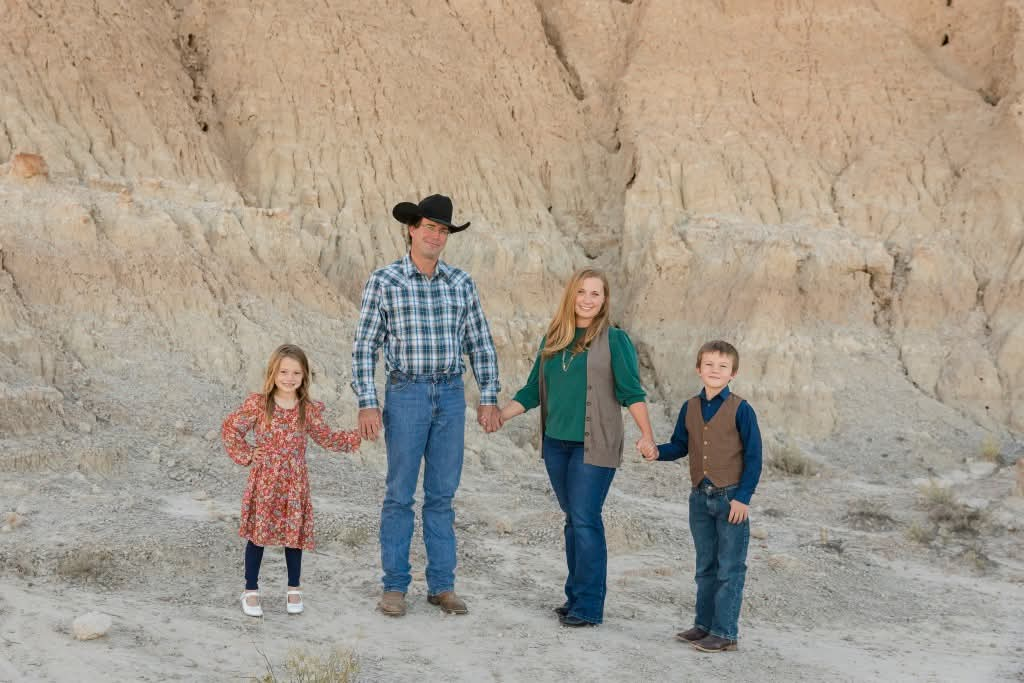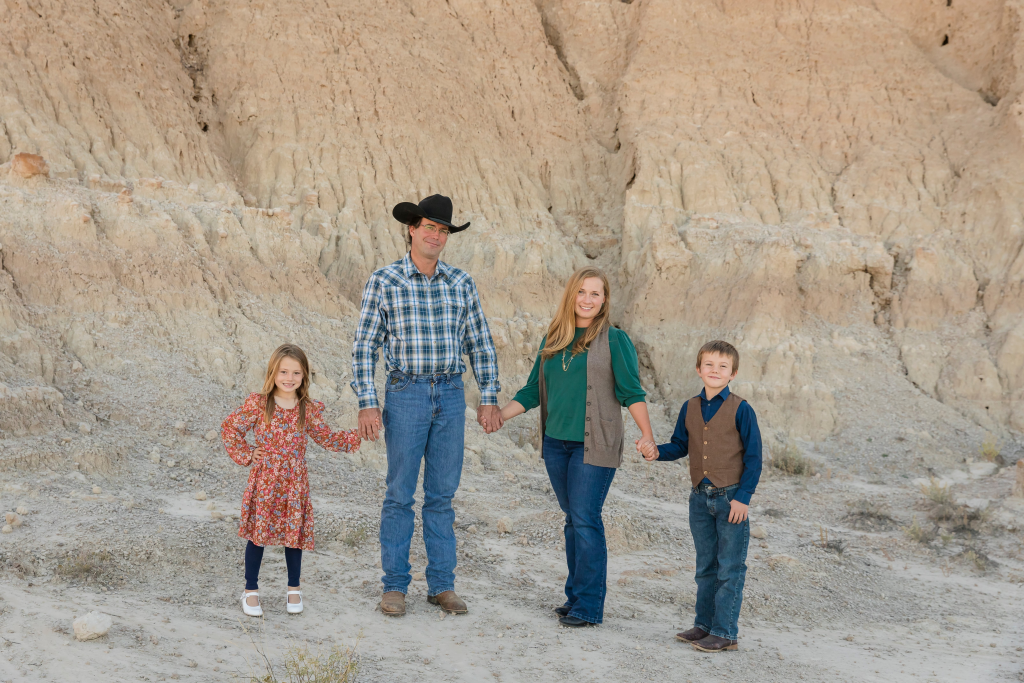Industry spokesmen call on President Trump to dismiss case against Maudes ▪︎ News | Feb 4, 2025. Carrie Stadheim editorial@tsln-fre.com
“What needs to happen is they need to resolve that boundary issue and dismiss the case,” Congresswoman Hageman said.
☆

Four members of Congress asked the presiding judge for a briefing on the Charles and Heather Maude case.
The situation — a question about a boundary and fenceline — is not out of the ordinary. “What was out of the ordinary was the Forest Service response,” Hageman said. She doesn’t believe a policy change in the way of hiring standards is needed, but “We need to hire people with common sense who aren’t little tyrants. They should be fired if they act this way. If he has a history of this kind of behavior, he should be separated from this kind of service.”
Congresswoman Hageman said in an interview that she has been in contact with the U.S. Forest Service and its mothership, the U.S. Department of Agriculture regarding this issue, and she believes it is a high priority for that agency, particularly as the leadership is changing.
She said the officer and agency acted “rogue” in this case, adding that “everyone kind of recognizes how extreme this agency went when it didn’t need to.”
“What needs to happen is they need to resolve that boundary issue and dismiss the case,” she said.
READ MORE AT:
https://www.thefencepost.com/news/industry-spokesmen-call-on-president-trump-to-dismiss-case-against-maudes

"Kennedy, Charles, Heather and Lyle Maude live on the edge of the South Dakota Badlands where they farm and ranch. They operate on a National Grasslands grazing allotment under the U.S. Forest Service, and graze their own private land as well. Photo by Elsie Fortuneto Maudes-RFP-021025 ____________________________
Four members of Congress asked the presiding judge for a briefing on the Charles and Heather Maude case. Reps. Harriet Hageman, R-Wyo., Dusty Johnson, R-S.D., Jim Jordan, R-Ohio, Chairman of the Judiciary Committee and Bruce Westerman, R-Ark., Chairman of the Committee on Natural Resources asked U.S. Attorney Alison J. Ramsdell, to schedule a briefing on the case by Feb. 5, 2025.
Ramsdell is the justice who signed the indictment charging Charles and Heather Maude of Caputa, S.D., (about 40 miles east of Rapid City) separately for theft of federal property. The indictment says the two of them did “knowingly steal, purloin and convert to their own use National Grasslands… approximately 25 acres of National Grasslands for cultivation and approximately 25 acres of National Grasslands for grazing cattle, having a value in excess of $1,000.”
The National Grasslands is under the umbrella of the U.S. Forest Service, which is under the U.S. Department of Agriculture.
A spokesman for Justice Ramsdell said that Ramsdell “received the letter and forwarded it to the department’s office of Legislative Affairs in accordance with department policy.” The spokesman added that “The Office of Legislative Affairs will respond to the inquiring offices.”
Currently the Maudes’ hearing is set for April 29, 2025, in federal court in Rapid City, S.D.
South Dakota Sen. Mike Rounds staff member Jim Selcher said he is not aware of any effort on the USFS’s part to sit down with the Maudes, adding that at this point the Maudes’ lawyers may very well advise against such a meeting unless a dismissal was the meeting topic.
Congresswoman Hageman said in an interview that she has been in contact with the U.S. Forest Service and its mothership, the U.S. Department of Agriculture regarding this issue, and she believes it is a high priority for that agency, particularly as the leadership is changing.
She said the officer and agency acted “rogue” in this case, adding that “everyone kind of recognizes how extreme this agency went when it didn’t need to.”
“What needs to happen is they need to resolve that boundary issue and dismiss the case,” she said.
GETTING A DISMISSAL
As for getting the Maudes square again, Hageman said there are opportunities for them to pursue if their case is dismissed, such as the Equal Access to Justice Act, which allows people to pursue compensation if they sue the federal government or if the federal government wrongly brings a case against them. Hageman hasn’t looked into those opportunities in this context — her priority at the time is to achieve a dismissal.
The situation — a question about a boundary and fenceline — is not out of the ordinary. “What was out of the ordinary was the Forest Service response,” Hageman said. She doesn’t believe a policy change in the way of hiring standards is needed, but “We need to hire people with common sense who aren’t little tyrants. They should be fired if they act this way. If he has a history of this kind of behavior, he should be separated from this kind of service.”
Hageman said Congress should consider de-militarizing government agencies. “Why have we weaponized these agencies? Why do they need weapons and ammunition? They can call the sheriff; that is the person who has jurisdiction in these matters.”
Hageman added that a bill she has sponsored, called the PASTURES Act would essentially enforce range law on federal lands, so that if allotments are bought out or taken away, the federal government, not the adjoining private landowner, is required to fence the land to keep cattle out.
Hageman said that although this is an “unusual circumstance,” she isn’t totally surprised it happened because radical anti-grazing groups have gained more and more influence in government agencies. “I think this is a cautionary tale of how government has become too big, too powerful and too controlling. We as American citizens need to push back and say, ‘this isn’t acceptable. This isn’t how we settle disputes.'”
LONGTIME RANCHERS
Charles and Heather Maude, who ranch and raise hogs near the South Dakota Badlands operate on land that has been in the Maude family since the turn of the century, and have maintained grazing agreements in good standing since the inception of the U.S. Forest Service, according to neighbor Scott Edoff.
Shad Sullivan, a Colorado rancher and chair of R-CALF USA’s Private Property Rights Committee, said he hopes people and organizations will write letters to the incoming U.S. Secretary of Agriculture, U.S. Attorney General and their local representatives, asking for a dismissal of the Maude case.
“They need to drop this case,” he said. “This case is so egregious, so overhanded, that it’s ridiculous. It’s an embarrassment for the U.S. Forest Service and for America.”
Sullivan called this case a precedent-setter and said that if the Maudes are actually found guilty of a crime, it will be a grievous mistake. “Let’s say a rancher has to rebuild fence after a fire, how can they rebuild and be sure they can make the bureaucrats happy?”
He adds that this case likely makes every allotment owner wonder if he or she is next. “The Maudes met with the Forest Service as requested, they were working to find a resolution. Now nobody knows what the right action is to take.”
This government overreach is ultimately about “control of the land,” he said.
“When they say cows are killing the planet, it’s not about the cow, it’s about the land. They want the land because if they control the land, they can control the food supply and control the will of the people.”
The U.S. Forest Service approached Frank Bloom, a rancher and neighbor to the Maudes about a parcel of land under his management. The USFS conducted a survey on the property, which is about five or six miles from the property in the Maude dispute.
Bloom and the USFS had planned to meet Jan. 31, but the USFS canceled the meeting at the last minute.
Jeff Sayer, who worked for Idaho Republican Sen. Larry Craig for at least five years, dealing with constituent issues, often times related to federal lands, said he’s never seen an agency take such an extreme measure for such a minor dispute.
“I feel for those people. Going to federal court is a big deal,” he said. “In this case, I think someone made a mistake, and now it’s a domino effect.”
The federal government has set a precedent for working out these issues, finding a solution. That’s how they used to do it. They are in business with these ranchers.”
Sullivan and others involved hope the new administration will determine that the Maudes have been targeted unfairly.
“The Maudes are in good standing with the U.S. Forest Service to this day. That fenceline was put in long before they were even born and they’ve never had a report against them, ever,” he said. “In America, we govern from the bottom up. This case is egregious and it needs to be dealt with by the Trump administration. Swiftly.”
Charles and Heather Maude, separately charged, are forbidden from discussing the case, and must retain separate legal counsel."
Donations can be made via GoFundMe titled “Help the Maude Family Preserve their Legacy” or checks can be addressed to “the Maude Legal Fund” and mailed to First Interstate Band at 404 S. Ave. A, New Underwood, SD 57761. ☆
Comparing history to the events of today for an expectation of the future, for our world and mankind as a whole.
Under Section 107 of the Copyright Act 1976, allowance is made for “fair use” for purposes such as criticism, comment, news reporting, teaching, scholarship, and research.
☆

